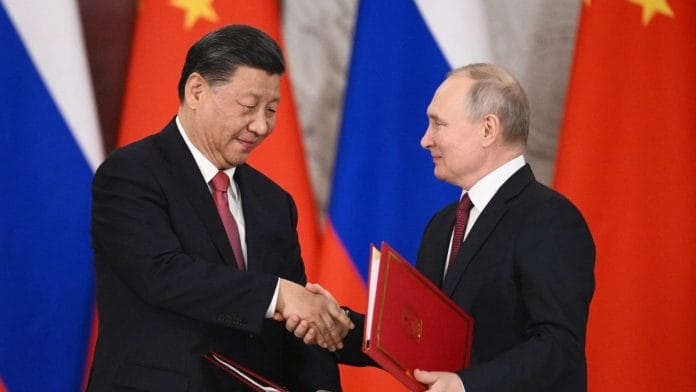Israel’s Operation Rising Lion seemed to be an independently led series of strikes against Iran. But after six bombers flew 18 hours to attack three nuclear sites in Iran, Israel’s action now seems to have been part of a broader deception strategy—which the United States utilised to dismantle Iran’s nuclear programme.
How does this play out for powers like Russia and China, which have continued to speak out against any military action? In March this year, Russia, China, and Iran had jointly stated that Tehran’s nuclear programme is “exclusively for peaceful purposes, and not for the development of nuclear weapons.”
Where does Russia stand?
The Russian foreign ministry, in a wordy statement, condemned American strikes on “several nuclear facilities in the Islamic Republic of Iran.” Russia even reiterated its previous statement – that the US attack stood in “violation of international law, the UN Charter, and relevant resolutions by the UN Security Council, which has consistently and unequivocally deemed such actions unacceptable.”
In its call for peace, Russia further demanded “an immediate end to aggression and for stepping up efforts to bring the situation back onto a peaceful, diplomatic track.”
Russia’s position on the crisis remains standard—calling for peace, negotiations, and diplomacy as effective channels for a resolution. Meanwhile, no part of Russia’s statement claims direct intervention in the crisis, which must come as no surprise.
Although a strategic partner of Iran, Russia’s offerings have been more implicit, such as supporting Tehran’s civilian nuclear programme or defence exports. While the Kremlin itself is fighting a war next door, it may still offer to play the role of a cardinal peacebroker between the US and Iran—and prove to be the most effective of all.
Russia remains the best-suited friend for Iran in the present crisis. Moscow stands as Iran’s most strategically placed partner in the region. It not only possesses deep regional expertise but has operated militarily and diplomatically across the Middle East for decades. And if Iran is to receive any meaningful backing against the US and its allies, it can come only from a capable nuclear power like Russia. A most unlikely situation.
Meanwhile, as Iranian foreign minister Abbas Araghchi proceeds to meet President Vladimir Putin, Russia could project a few probable security guarantees on Iran’s behalf. This could include assurances against regime-change operations—an option President Donald Trump has openly considered on his social media—recognition of Iran’s sovereignty and right to self-defence, and possible military non-aggression agreements brokered through multilateral channels.
As for the United States and its allies, Russia may push for Iran’s recommitment to nuclear limits under renewed international supervision, ending any proxy attacks on American and allied forces and perhaps securing more regional support for Iran. Aside from peace brokerage, Russia can offer its military-technical cooperation—which can include upgrading Iran’s advanced air defence systems, sharing real-time satellite surveillance data to help Iran monitor US troop movements or detect incoming attacks, and providing space surveillance support.
But what about this conflict’s likely impact on Russia? It’s less of a blow and more of an opportunity. As global crude oil prices surge, Moscow might return as the most reliable oil exporter globally. Second, there will likely be reduced American attention toward the Black Sea, Eastern Europe, and the Arctic—which are fundamental to the Kremlin’s strategic vision for the region. It has also restored Russia’s position in the global power lexicon, which had weakened after the Ukraine war.
Also read:
China’s response
China, too, has condemned the attack, citing violation of the UN charter and international law. While this seems to be the standard response, Tehran values solidarity. China, however, would not directly engage in the conflict for two big reasons.
First, Beijing likes to maintain strategic ambiguity over military risks and prefers to exert influence through diplomacy, economic leverage, and other indirect means. Directly confronting the US—whose prominence, mainly in terms of naval presence, has only grown—offers little advantage. Second, China’s primary concern is energy stability. Direct involvement in a Gulf conflict would jeopardise its vital oil imports.
While disruptions to Iranian oil exports would undoubtedly impact China, any direct military involvement would force Beijing to undertake a substantial and risky reconfiguration of its broader energy import strategy with other Gulf partners—which would be risky and unaffordable.
However, there are other possible ways for Beijing to support Iran. While China avoids overt arms transfer to hot zones, it can covertly share technology that may include missile guidance technology, drones, cyber tactics, and so on. There was a strong role of space technology in the US’s attacks on Iran, allowing it to strike nuclear bases with precision and without being detected. China could covertly offer limited space technology to support Iran, which Russia is also likely to offer.
As permanent members of the United Nations Security Council, Russia and China possess significant diplomatic influence that they can jointly utilise to advocate for Iran’s position and pressure the UN to take meaningful actions.
Meanwhile, the effectiveness of this diplomatic support against America’s non-concessional stance on Tehran’s nuclear ambitions remains to be seen.
But both Russia and China are well-positioned to lead global efforts through multilateral institutions such as the UN and the International Atomic Energy Agency. They can push for an international recognition of the potential radioactive and humanitarian consequences of further escalation, and urge a shift from punitive frameworks to preventive diplomacy.
Rishi Gupta is a commentator on global affairs. Views are personal.
(Edited by Zoya Bhatti)






